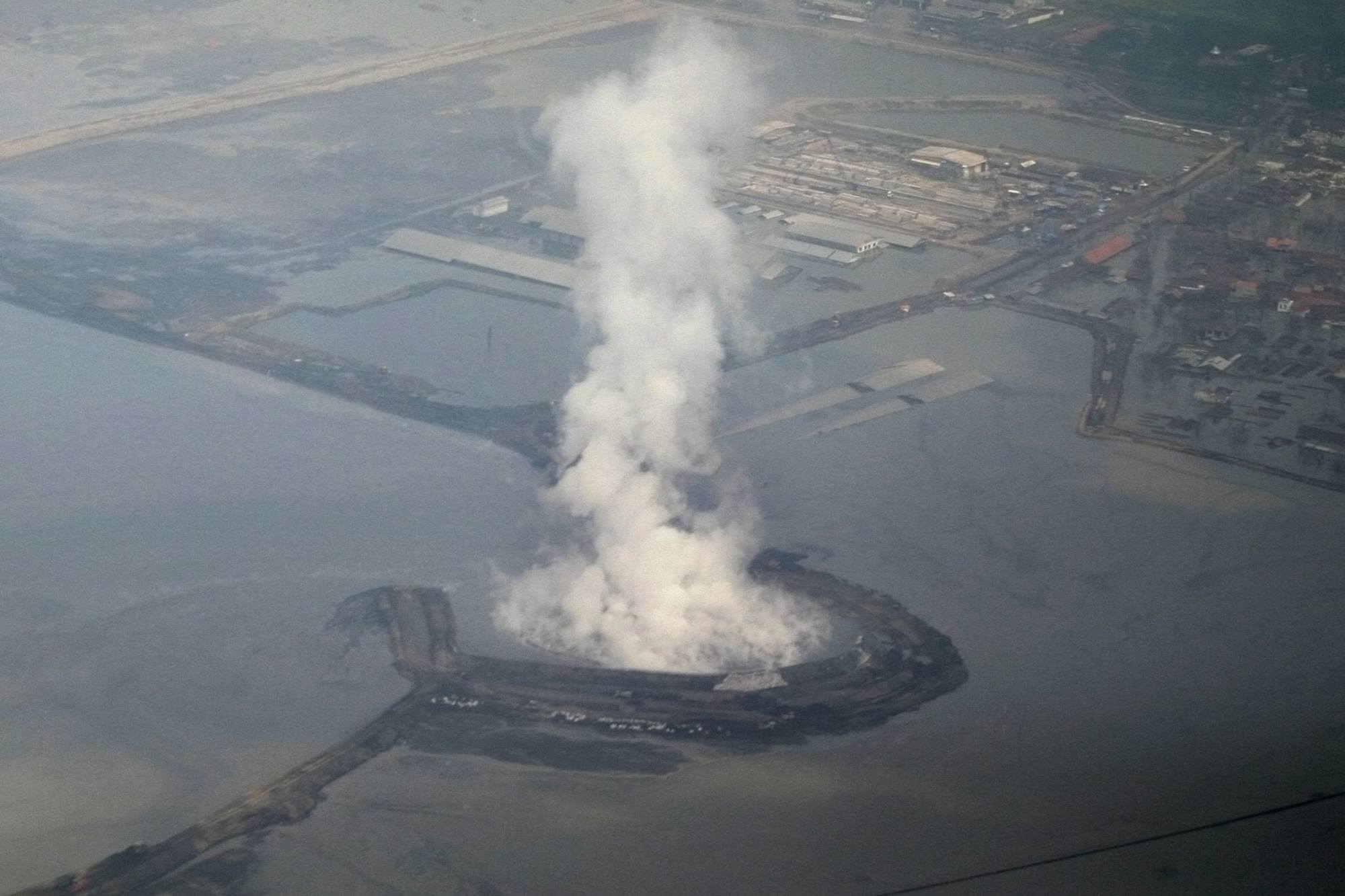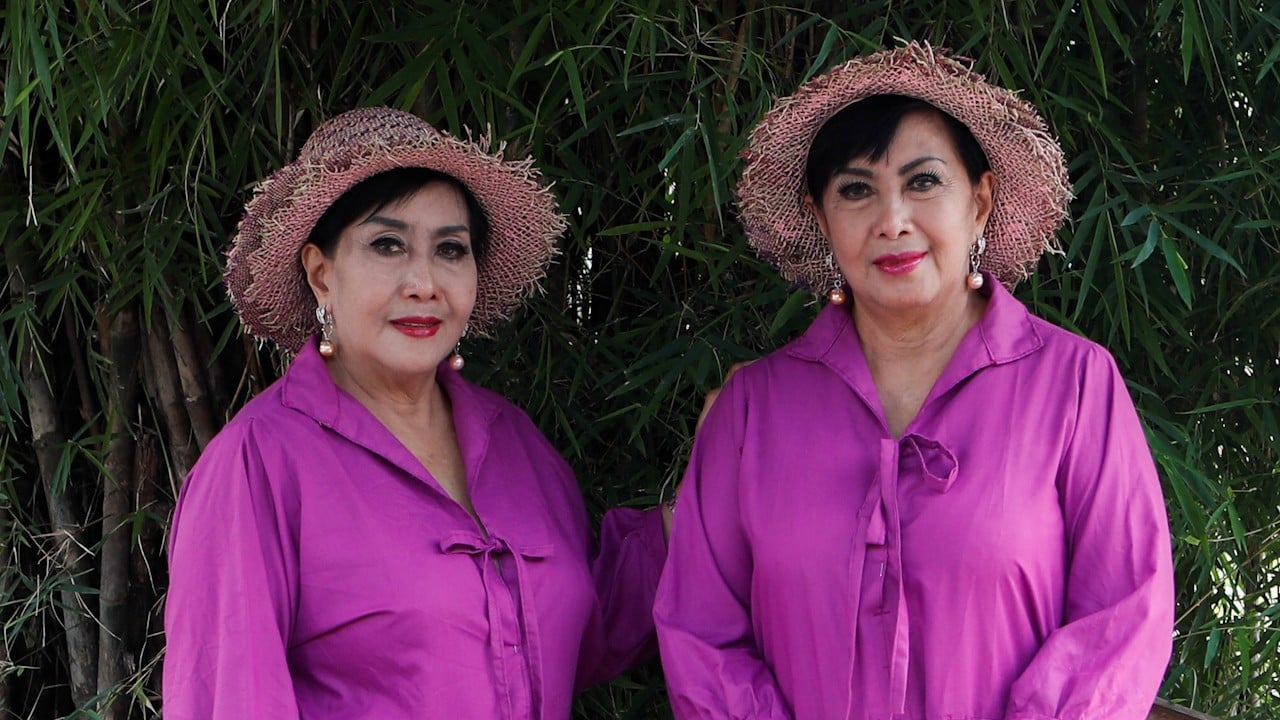
Dispossessed by Indonesia’s ‘mud volcano’, villagers rebuild homes but lose community
- The disastrous ‘Lapindo Mudflow’ or ‘mud volcano’ forced thousands of people from their homes in May 2006 in Indonesia
- Uprooted once by calamity beyond their control, families are now divided by petty rivalries in the fight to gain legal ownership of their land
Disputes remain over the cause, as the eruption followed drilling by oil company Lapindo Brantas as well as an earthquake that devastated Yogyakarta and was later found to have geothermal underground links to Sidoarjo.

Yet the mass of mud and dangerous methane gas that erupted was unable to be stemmed, surging across an area of more than 650 hectares, submerging homes, factories, schools and religious sites.
It has not stopped since. Instead it has solidified into a 40-metre deep cake of mud, entombing villages underneath a mass hard enough to walk on. A containment wall holds the fresh, daily flow, which geologists fear may continue for decades.
Stark images of the thick mud have generated endless negative headlines for Indonesia over both its disaster management and the government’s apparent capitulation in the face of major corporate interests.
Most of us wanted to stick together as a village and start over. Some went their separate ways but most stayed to rebuild
Lilik Kaminah’s village was one of 16 claimed by the unstoppable torrent.
The 45-year-old homemaker was forced to live in a temporary shelter for three years before resettling 7km away in Kedungsolo.
“All of us, shoulder to shoulder, built a new hamlet from the ground up and named it Reno Joyo in honour of our old village,” Kaminah said.
“Most of us wanted to stick together as a village and start over. Some went their separate ways but most stayed to rebuild our new hamlet.”
The residents have sought to recreate their former lives by modelling their new homes after their old ones.
Hemmed in by banana and cane fields on one side and a river on the other, Reno Joyo’s idyllic atmosphere belies the tensions within.
Finding comfort in religion in lives defined by the uncertainty of nature, most residents pray diligently in the newly built musholla – or prayer houses – that dot the hamlet.
Many have tried to return to their previous jobs as farm or construction labourers, with some degree of success, but others have been unable to find work and have had to rely on the charity of their neighbours.

Title fight
Yet years on and several kilometres from the disaster site, the mudflow still shapes their existence. More than 460 households have been unable to secure title deeds to their new homes and therefore are, they say, at risk of further dispossession.
The villagers say they still need land deeds certified by Indonesia’s National Land Agency (BPN).
Until then their status remains precarious in an area riven with land “mafias” who target properties without legal documents and bring the ownership into dispute before filing for a new deed.
The majority of us were fisherfolk and farmers, so we could only rebuild our lives where our livelihood was
The new hamlet has faced other challenges. It was not until 2008 that Lapindo Brantas committed to compensating the mudflow victims for their lost homes.
“We turned down their initial offer of temporary accommodation and took to the streets and held protests to bring pressure to bear,” said Yudo Wintoko, one of the resettlement pioneers.
“The majority of us were fisherfolk and farmers, so we could only rebuild our lives where our livelihood was,” said the 48-year-old.
When restitution came, some had to use the money to pay off old debts and were left with little to rebuild.
Lapindo Brantas is a subsidiary of the Bakrie Group, a conglomerate belonging to one of Indonesia’s richest men and at the time coordinating minister for economic affairs, Aburizal Bakrie.
In 2008, the company agreed to pay 20 per cent of the restitution funds, with the rest to be paid within two years.
But the victims’ travails went on until 2016 when the company finally coughed up the rest of the payment to the victims, after the government bailed it out with a loan.

Disaster researcher Trinirmalaningrum said the Indonesian government’s handling of the Lapindo mudflow was half-hearted.
“The fact Lapindo wasn’t penalised set a bad precedent for future industry-related environmental disasters,” he said.
The company insists a 2016 Supreme Court verdict cleared it of any responsibility for the mudflow eruption.
“Various independent scientific studies back the idea that the disaster was connected with volcanic activity in the area, so we were not liable,” Andi Darrusalaam, spokesman for Lapindo, told This Week in Asia. “We went above and beyond by buying out their land.”

Divided we fall
The arduous process has taken its toll on the dispossessed communities.
The first casualty, explains Wintoko, was their camaraderie and unity. “As everyone scrambled to find solutions to our problem with land deeds, we fragmented into two opposing camps,” he said.
The feud escalated when one group filed two complaints to the police alleging land misappropriation, fraud and embezzlement against the other.
“The complaints were baseless,” said lawyer Krisna Budi Tjahjono, legal counsel for Wintoko’s group.
One of the cases had been resolved, but the other still casts a shadow over the land certification process for the larger portion of the hamlet, the advocate added.
“The BPN now refuses to issue land deeds as long as the case is still under investigation.”
The advocate alleges the complainants had obtained title deeds to their properties in return for supporting a local politician, Rahmat Muhajirin, a member of the House of Representatives for the constituency of East Java I. He denies fomenting division among the village.
“People say we were lucky to be compensated,” said Wintoko, who is also a labour activist. “But they forget Lapindo only paid us for our land. There was a house on that land, too, built with our blood and sweat.”


